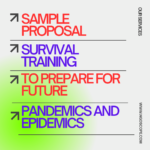Introduction: Sample Proposal for Survival Training to Prepare for Future Pandemics and Epidemics, the world has witnessed a concerning rise in pandemics and epidemics in recent years. Factors like increased global travel and the overuse of antibiotics contribute to the emergence and spread of infectious diseases. These events pose significant threats to public health, causing illness, straining healthcare systems, and disrupting daily life.
While public health officials work tirelessly to control outbreaks, individual and community preparedness is crucial in mitigating their impact. This proposal outlines a comprehensive survival training program designed to empower individuals, families, and workplaces to navigate future pandemics and epidemics effectively.
(Sample Proposal for Survival Training to Prepare for Future Pandemics and Epidemics)
Briefly describe the growing threat of pandemics and epidemics due to factors like globalization and antibiotic resistance.
The world faces a growing threat from increasingly frequent and severe pandemics and epidemics. Globalization, with its ease of travel and interconnectedness, allows infectious diseases to spread rapidly across continents. Furthermore, the overuse and misuse of antibiotics have led to the emergence of antibiotic-resistant bacteria, making it harder to treat common infections and potentially rendering existing medications ineffective against future outbreaks. These factors combine to create a critical need for public preparedness to ensure we can effectively respond to these emerging health threats.
Highlight the importance of public preparedness for such events.
The importance of public preparedness for pandemics and epidemics cannot be overstated. While scientific advancements and public health interventions play a vital role in controlling outbreaks, individual and community readiness can significantly lessen their impact. By equipping ourselves with the necessary knowledge and skills, we can safeguard ourselves and our loved ones, reduce strain on healthcare systems, and contribute to a more resilient society in the face of these growing public health threats.
Needs Assessment (Sample Proposal for Survival Training to Prepare for Future Pandemics and Epidemics)
The public, particularly families, communities, and workplaces, often experience significant knowledge gaps and anxieties surrounding pandemics and epidemics. These anxieties can stem from a lack of understanding about how these diseases spread, their potential severity, and the appropriate preventative measures.
Knowledge Gaps:
- Transmission and Risk Factors:Many lack a clear understanding of how these diseases transmit, the associated risk factors, and the effectiveness of preventive measures.
- Resource Management:Uncertainty exists around proper food and water storage techniques, essential supplies needed during lockdowns, and reliable information sources during outbreaks.
- Mental Health and Wellbeing:Concerns often arise regarding managing stress and anxiety during isolation, maintaining social connections, and coping with potential disruptions to daily routines.
Anxieties and Concerns:
- Health Risks:Fear of contracting the disease and its potential complications is a primary concern, especially for families with vulnerable members.
- Social and Economic Disruption:Lockdowns and movement restrictions can cause anxieties around social isolation, job security, and access to essential goods and services.
- Information Overload:The proliferation of information during outbreaks, some of it inaccurate, can lead to confusion and difficulty discerning reliable sources.
Need for Practical Skills and Resources:
To effectively navigate pandemics and epidemics, individuals, families, and workplaces require practical skills and resources. These include:
- Hygiene practices:Understanding proper handwashing techniques, sanitizing surfaces, and safe handling of potentially contaminated materials.
- Food storage and preparation:Learning proper food storage techniques to ensure access to safe and nutritious meals during disruptions.
- Information Literacy:Equipping themselves with the ability to critically evaluate information sources and identify reliable health guidance.
- Resource Management:Developing strategies for managing essential supplies like medications, sanitation products, and first-aid kits.
- Coping mechanisms:Learning coping skills to manage stress, anxiety, and social isolation during lockdowns and periods of social distancing.
By addressing these knowledge gaps and anxieties through practical training, we can empower individuals and communities to be more prepared and resilient in the face of future pandemics and epidemics.
Program Description (Sample Proposal for Survival Training to Prepare for Future Pandemics and Epidemics)
This comprehensive survival training program is designed to empower a broad audience. We offer tailored modules for:
- Individuals:Equipping individuals with the knowledge and skills to protect themselves and navigate pandemics effectively.
- Families:Providing families with practical strategies for safeguarding their members and maintaining a healthy home environment during outbreaks.
- Workplaces:Helping workplaces create a culture of preparedness and implement effective protocols to minimize disruption and ensure employee well-being.
Program Objectives:
The program focuses on equipping participants with practical skills and knowledge to navigate pandemics and epidemics effectively. Key learning objectives include:
- Understanding Pandemics and Epidemics:Participants will gain a clear understanding of how these diseases spread, risk factors, and the importance of preventive measures.
- Hygiene and Sanitation Practices:The program will cover proper handwashing techniques, surface disinfection methods, and safe handling of potentially contaminated materials.
- Food Storage and Preparation:Participants will learn essential food storage techniques to ensure access to safe and nutritious meals during disruptions to supply chains.
- Resource Management:The program will equip participants with strategies for managing essential supplies like medications, sanitation products, and first-aid kits.
- Information Literacy:Participants will develop critical thinking skills to evaluate information sources and identify reliable health guidance during outbreaks.
- Mental Health and Coping Mechanisms:The program will address strategies for managing stress, anxiety, and social isolation during lockdowns and periods of social distancing.
Training Format:
To cater to diverse learning styles and schedules, the program will offer a flexible format:
- Interactive Workshops:Facilitated workshops will provide a platform for participants to ask questions, share experiences, and engage in practical exercises.
- Online Modules:The program will offer a series of informative online modules accessible at participants’ convenience.
- Hands-on Sessions:For specific modules like food storage and sanitation practices, hands-on sessions will allow participants to gain practical skills through simulation exercises.
Guest Speakers:
To enrich the learning experience, the program will incorporate guest speakers from public health or emergency preparedness backgrounds. These experts will share their insights, address specific concerns, and provide valuable real-world perspectives on pandemic preparedness.
Training Modules (Examples):
This program offers a series of interactive modules designed to equip participants with the knowledge and skills necessary to navigate pandemics and epidemics effectively.
Module 1: Understanding Pandemics and Epidemics
- Transmission Modes:This module will explore how different pathogens spread, including airborne, droplet, and contact transmission. Participants will learn about factors influencing transmission rates and the importance of preventive measures.
- Risk Factors:The module will identify individual and environmental factors that can increase susceptibility to infectious diseases. This includes discussions on age, underlying health conditions, and socioeconomic determinants of health.
- Public Health Interventions:Participants will gain an understanding of public health measures implemented during outbreaks, such as contact tracing, social distancing, and vaccination campaigns.
Module 2: Home Preparedness
- Sanitation Practices:This module will focus on proper handwashing techniques, surface disinfection methods, and safe handling of potentially contaminated materials. Participants will learn how to create a clean and sanitized environment at home.
- Food Storage Techniques:The module will explore essential food storage techniques to ensure access to safe and nutritious meals during disruptions to supply chains. This will cover proper storage methods for different food groups and emergency food options.
- Water Purification Methods:Participants will learn various methods for purifying water in case of disruptions to clean water supplies. This may include boiling, filtration, and disinfection with household chemicals (following safe practices).
- Assembling a First-Aid Kit:The module will guide participants in assembling a comprehensive first-aid kit to address minor injuries and illnesses during an outbreak.
Module 3: Information Literacy and Resource Management
- Evaluating Trustworthy Information:This module will equip participants with critical thinking skills to evaluate information sources during outbreaks. It will cover identifying reliable health organizations, fact-checking techniques, and recognizing misinformation.
- Managing Essential Supplies:The program will teach participants strategies for managing essential supplies like medications, sanitation products, and first-aid kits during potential shortages.
- Creating a Communication Plan:This module will guide participants in establishing a communication plan for staying connected with loved ones during lockdowns or periods of limited social interaction.
Module 4: Mental Health and Wellbeing
- Stress Management Techniques:This module will equip participants with practical stress management techniques like relaxation exercises, mindfulness practices, and healthy coping mechanisms.
- Coping with Social Isolation:The program will address strategies for coping with social isolation during lockdowns and periods of social distancing. This may include virtual communication methods, maintaining online social connections, and alternative forms of social interaction.
- Maintaining Social Connections During Isolation:Participants will explore ways to maintain social connections with loved ones while adhering to social distancing guidelines. This may involve virtual activities, phone calls, and creative ways to connect safely with those outside the home environment.
These modules will be delivered through a combination of interactive workshops, online learning materials, and practical exercises. The program can be tailored to the specific needs of the target audience (individuals, families, workplaces) to ensure the information is relevant and actionable.
Program Benefits (Sample Proposal for Survival Training to Prepare for Future Pandemics and Epidemics)
This comprehensive survival training program offers a multitude of benefits for participants and communities alike.
Empowering Well-being:
- Increased Knowledge and Confidence:By equipping them with essential knowledge and skills, this training empowers participants to take charge of their well-being during pandemics and epidemics. This fosters a sense of control and reduces anxieties associated with the unknown.
- Improved Decision-Making:The program equips participants with the ability to critically evaluate information, make informed decisions about personal safety and hygiene practices, and effectively manage resources during challenging situations.
- Enhanced Preparedness:Participants gain a sense of preparedness, knowing they have the skills and resources to navigate a potential outbreak effectively. This reduces stress and anxiety, allowing them to focus on taking care of themselves and their loved ones.
Community Benefits:
- Reduced Strain on Healthcare Systems:By promoting individual preparedness and self-care, this training program can potentially reduce the burden on healthcare systems during outbreaks. People equipped with basic first-aid skills can manage minor ailments at home, freeing up medical professionals to focus on more critical cases.
- Increased Social Resilience:By fostering a culture of preparedness within communities, the program can strengthen social resilience during pandemics. Informed and prepared individuals are more likely to follow public health guidelines and support one another during challenging times.
- Promoting Public Health:The program’s emphasis on hygiene practices and information literacy can contribute to broader public health goals. By promoting safe practices and responsible information sharing, the program can help slow the spread of infectious diseases and minimize the overall impact of outbreaks.
In conclusion, this survival training program offers a valuable investment in individual and community well-being. By empowering participants with practical skills and knowledge, we can build a more resilient society prepared to face the challenges of future pandemics and epidemics.
Program Logistics (Sample Proposal for Survival Training to Prepare for Future Pandemics and Epidemics)
Timeframe:
The program offers flexibility to cater to various needs. We propose two options:
- Option 1: Intensive Workshop Series (4 weeks):This intensive option consists of weekly, 2-hour workshops spread over four consecutive weeks. This format allows for in-depth exploration of each module and ample time for practical exercises and discussions.
- Option 2: Self-Paced Online Modules:The program can also be delivered through a series of online modules accessible at participants’ convenience. This option provides greater flexibility for busy schedules and allows participants to complete the training at their own pace.
Training Location/Platform:
- Option 1:For the workshop series, the training location will be determined based on enrollment numbers and participant needs. We can accommodate the program at a community center, conference room, or other suitable facility.
- Option 2:For the online program, the training will be delivered through a user-friendly learning management system (LMS) accessible via computer, tablet, or smartphone. Participants will have access to all modules, resources, and communication tools within the platform.
Trainers:
The program will be led by a team of experienced trainers with backgrounds in public health, emergency preparedness, and adult education. Our trainers will possess:
- Expertise in Public Health and Pandemics:In-depth knowledge of infectious disease transmission, public health interventions, and best practices for pandemic preparedness.
- Practical Skills and Experience:Experience in delivering survival training workshops and practical skills in areas like sanitation, food storage, and first-aid.
- Engaging Communication Skills:The ability to deliver complex information in an engaging and easy-to-understand manner, fostering a positive learning environment.
We are confident that our qualified trainers will provide participants with a valuable learning experience that equips them with the knowledge and skills necessary for effective pandemic preparedness.
Budget (Sample Proposal for Survival Training to Prepare for Future Pandemics and Epidemics)
This section provides a more comprehensive budget breakdown for the Survival Training Program. The specific costs will vary depending on factors like program format (workshop vs. online), participant numbers, and chosen training location.
Sample Budget Sheet
| Item | Option 1: Workshop Series (4 weeks) | Option 2: Online Modules |
| Trainer Fees | $4,000 | $3,000 |
| Training Materials | $700 (handouts, manuals, first-aid supplies) | $200 (online resources, development) |
| Venue Rental (if applicable) | $1,000 (meeting space for 4 sessions) | N/A |
| Learning Management System (LMS) Platform (if applicable) | N/A | $500 (subscription fee) |
| Participant Refreshments | $400 (light snacks and beverages for 4 sessions) | N/A |
| Marketing & Promotion | $200 (flyers, online advertising) | $100 (online advertising) |
| Trainer Travel & Expenses (if applicable) | $200 (potential travel reimbursement) | N/A |
| Total | $6,500 | $3,800 |
This is a sample budget sheet, you can bespoke it as per your requirements.
Monitoring and Evaluation Plan (Sample Proposal for Survival Training to Prepare for Future Pandemics and Epidemics)
A robust monitoring and evaluation plan is crucial for assessing the effectiveness of the Survival Training Program and ensuring it meets its intended learning objectives. This plan will utilize a combination of quantitative and qualitative methods to gauge participant knowledge gain, behavior changes, and overall program satisfaction.
| Evaluation Methods:
|
· Pre- and Post-Training Surveys: Participants will complete anonymous surveys before and after the training program. Pre-training surveys will assess baseline knowledge and anxieties regarding pandemics and epidemics. Post-training surveys will measure knowledge gain, identify areas for improvement, and gauge changes in participant confidence and preparedness.
· · Feedback Forms: Interactive feedback forms will be distributed at the conclusion of each module or after completing the online training program. These forms will gather participant feedback on the training content, delivery methods, and overall learning experience. · · Focus Groups (Optional): For in-depth qualitative insights, conducting optional focus group discussions with participants can be valuable. This allows for exploring participant experiences, identifying areas of confusion, and gathering suggestions for program improvement.
|
| Data Analysis:
|
· Survey data will be analyzed quantitatively to measure changes in knowledge scores and assess the program’s impact on participant preparedness.
· Feedback forms and focus group discussions will be analyzed qualitatively to identify recurring themes and areas for improvement.
|
| Evaluation Timeline:
|
· Pre-training surveys will be administered one week prior to program commencement.
· Post-training surveys and feedback forms will be distributed immediately following program completion.
· Focus groups (if applicable) will be conducted within two weeks of program completion.
|
| Evaluation Outcomes:
|
The results of the monitoring and evaluation plan will be used to:
· Demonstrate the program’s effectiveness: By measuring knowledge gain and changes in preparedness, we can demonstrate the program’s positive impact on participants.
· Identify areas for improvement: Feedback from participants will guide program refinements to ensure continued effectiveness and address knowledge gaps.
· Inform future program iterations: Evaluation data will inform future program development, tailoring content and delivery methods to better meet participant needs.
|
In essence, the Survival Training Program offers a critical investment in individual and community well-being. By equipping participants with the knowledge and skills necessary to navigate pandemics effectively, we can foster a more resilient society prepared to face the challenges of the future.
This comprehensive program addresses the knowledge gaps and anxieties surrounding pandemics, empowering individuals, families, and workplaces to take charge of their well-being during outbreaks. Through interactive workshops, online modules, and practical exercises, participants gain essential skills in areas like hygiene practices, food storage, resource management, and mental health coping mechanisms.
The program offers both individual and community benefits. Participants gain a sense of control and confidence, while communities become more resilient through increased preparedness and informed public health practices. The flexible program format caters to diverse needs, with options for intensive workshops or self-paced online learning.
We are confident that this cost-effective program, with its robust monitoring and evaluation plan, will demonstrate its effectiveness in empowering individuals and communities. By investing in preparedness, we can build a future where we are better equipped to navigate the challenges of pandemics and epidemics, safeguarding public health and promoting well-being for all.
Related Good Reads, Link
Hey, STEAL our Best Premium Content For Absolutely Free, Check Out the Links below
HOPE these will add value to your existing skills and knowledge
Our information bears no cost (it’s absolutely FREE), don’t let valuable information slip away.
Join our community of avid readers who are always in the know. Subscribe to our website; stay connected and engaged with the latest news, trends, and developments by subscribing today.
(PUSH the bell ICON)
Leverage the power of knowledge to propel your organization to new heights. Don’t miss out to explore our content
- Latest Funds for NGOs,
- NGO Jobs
- Resources (Helpful Guides and Courses)
- Premium Resources
- NGO related articles
Empowering Humanity through Funds, Resources and Collective Action
Sharing is Appreciated









